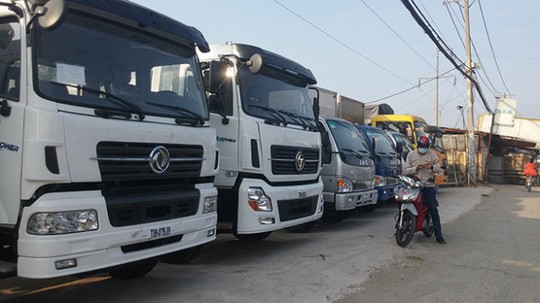The Vietnam Association of Mechanical Industry (VAMI) has said that the sudden increase in Chinese truck imports could kill domestic production.

A report showed that the number of Chinese trucks imported in January 2015 was double that of last year.
Businesses specializing in distributing Chinese trucks have confirmed that they had imported more products to satisfy domestic demand.
Tran Trung Thanh, director of Phu Cuong Company, said he had leased the 2,000 square meter retail premises in Binh Chanh District in HCM City to sell trucks. This is Thanh’s third shop in HCM City.
Chinese truck imports are expected to increase sharply this year because the Ministry of Transport has vowed to tighten control over the loading of vehicles in circulation.
A truck trader said he expects a two-digit sales growth rate this year as the national economy recovers.
Mai Phuoc Nghe, general director of Truong Hai Automobile, said that a 3-axis truck with a trailer could carry 60-80 tons of cargo.
Meanwhile, such a vehicle can now carry 32 tons of goods. Transport firms have to buy more vehicles to satisfy customer demand.
Hino Motors Vietnam has launched the Hino 300 series, a light truck model, for VND600-725 million, nearly the same as the Fuso, about VND600 million. The company is also providing a medium-level Hino 500 series.
In addition, Thaco has marketed medium-size 8-18 ton trucks with Hyundai and Auman brands. Meanwhile, Isuzu Vietnam in May marketed a 9-ton NQR75M model which has a longer bodyshell than similar trucks, which make goods loading easier.
Chinese models, such as Dongfeng, Sinotruk, FAW, JAC and Chenglong, with lower prices, are the biggest rivals of these brands.
Nghe said that Thaco brand trucks are less competitive than Chinese imports in terms of price, because Chinese imports are 5-15 percent cheaper than Thaco’s products, although Thaco trucks have 30-40 percent locally made content.
Bui Ngoc Huyen, president of Vinaxuki, a 100 percent Vietnamese-owned automobile manufacturer, complained that the the government does not apply any measures to help develop support industries.
“The current policies do not support the development of domestic supporting industries, and also hinder the development of Vietnamese enterprises,” he commented.
Huyen said that domestic automobile manufacturers would fail when Chinese heavy trucks are taxed zero percent, while import components are taxed 24 percent.
However, a senior official at the Ministry of Finance denied that an unreasonable tax policy was behind the increase in imports.
He said that more Chinese products had entered the Vietnamese market because they were priced more competitively.
Meanwhile, the import tariff on most imports is around 50 percent, while automobiles taxed zero percent account for a small proportion only.
NLD